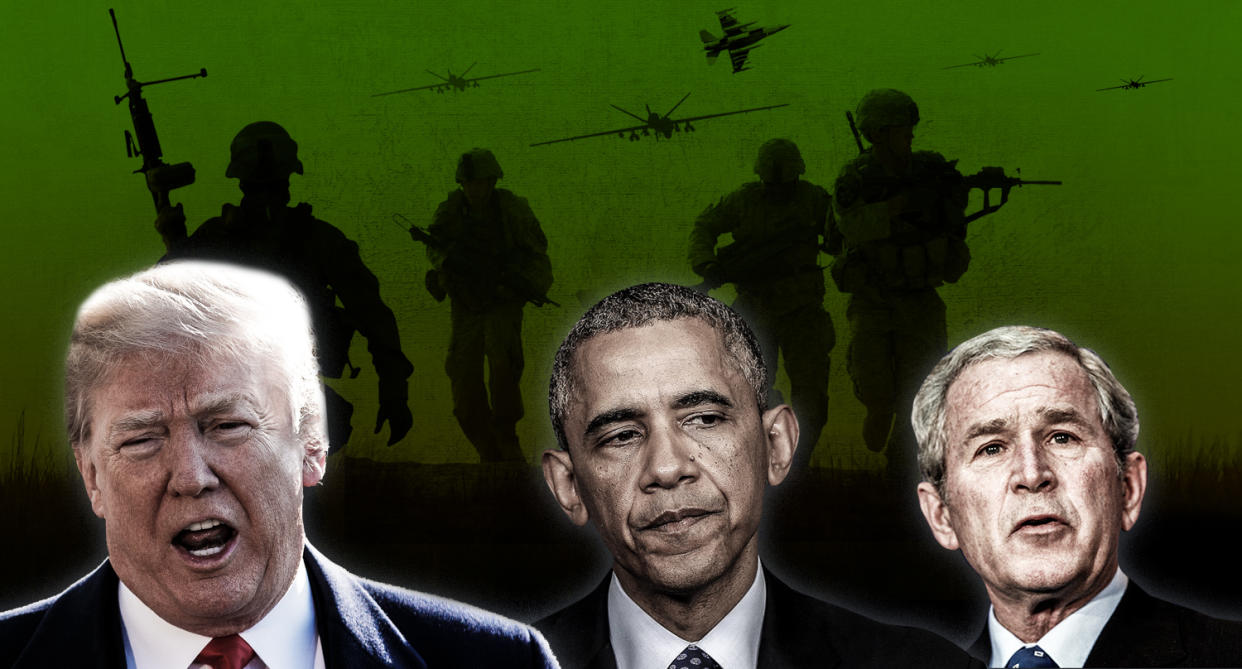Senate to take another look at the 2001 ‘war on terror’ resolution

Tackling a complex and divisive issue in an election year, the Senate Foreign Relations Committee next month will debate whether and how to revise or replace the nearly 17-year-old resolution that underpins America’s open-ended, borderless war on terrorism, the panel’s chairman announced Tuesday.
Presidents George W. Bush, Barack Obama, and Donald Trump have invoked the 2001 Authorization for Use of Military Force (AUMF), which essentially declared war on al-Qaida and set the stage for the invasion of Afghanistan, to justify using deadly force overseas — overtly, covertly, by sending in troops, ordering drone strikes, acting with or without congressional authority, with allies or unilaterally, and sometimes in ways that test the bounds of international law. They have also used the 2002 AUMF that gave the green light to the invasion of Iraq. The Trump administration most recently said the two measures permit him to keep troops in Syria and Iraq indefinitely.
Amid bipartisan calls for overhauling — or rescinding — those authorizations, Senate Foreign Relations Committee Chairman Bob Corker (R-Tenn.) said Tuesday that his panel will meet April 19 to discuss their possible “replacement and revision.”
“It’s been an issue that’s been before us for many years,” he said. “Many people were concerned about [it] because it has been so long since they were enacted. We have activities taking place around the world, still, based on those two authorizations.”
Several proposals for overhauling the president’s legal authority to make war have been floated in Congress in recent years, never quite gaining the political traction required for a proper debate, much less a vote. It was not clear which proposal the committee would debate.
“The way this AUMF is being constructed at present, when we go into new countries, when we take on new groups, the Senate would have the ability to weigh in on those issues,” Corker said.
That seemed to echo a proposal from Sen. Jeff Flake (R-Ariz.) and Tim Kaine (D-Va.), which would explicitly authorize making war on ISIS, al-Qaida and the Taliban, as well as “associated forces,” to be defined by the administration and Congress.
It’s not clear what position the Trump administration will take. The White House has repeatedly said it will not seek a new vote on the president’s war powers.
The United States has declared war formally just five times in its history, against 11 different countries: for the War of 1812, the Mexican-American War, the Spanish-American War, World War I and World War II. Technically, America’s longest war — the Afghanistan operation launched after Sept. 11 — isn’t a declared war. Neither were military operations in Korea, Vietnam, Panama or Iraq.
Obama sent Congress an AUMF request related to the so-called Islamic State in February 2015. It was dead on arrival.
The proposal reflected Obama’s national security aides’ desire that his hands not be tied. The document would have authorized airstrikes in Iraq and Syria over the following three years. It would have forbidden the use of American ground troops in “enduring offensive ground combat operations” — a term the Obama White House publicly described as deliberately vague. It also would have allowed strikes against “individuals and organizations fighting for, on behalf of, or alongside ISIL” anywhere in the world.
Democrats balked at supporting such a sweeping measure. Republicans pointed to the three-year limit and the ground combat language to argue that it would bind the hands of Obama’s successor.
The truth is that both sides saw political peril in the president’s proposal. The role Hillary Clinton’s support for the Iraq War played in her 2008 defeat haunted Democrats. And Republicans, who could have voted to remove the language they describe as objectionable, preferred to criticize Obama’s handling of the conflict without taking any steps that might make them co-owners of the strategy.
A lawmaker truly bent on forcing a debate on authorizing military action against, for instance, President Bashar Assad’s forces in Syria could try to use the 1973 Wars Powers Resolution, a law born of congressional anger at the way successive presidents expanded the conflict in Vietnam.
The law requires the president to notify Congress within 48 hours of introducing U.S. armed forces into conflict or into situations in which conflict is imminent. It also requires the withdrawal of U.S. forces after 60 days, with one 30-day extension, absent a declaration of war or an AUMF.
There’s a catch: Invoking the War Powers Resolution to force a debate would also require congressional action. And while presidents have cooperated with the reporting requirements, not one has formally accepted the resolution as setting constitutionally valid restrictions on the commander in chief.
Read more from Yahoo News:


